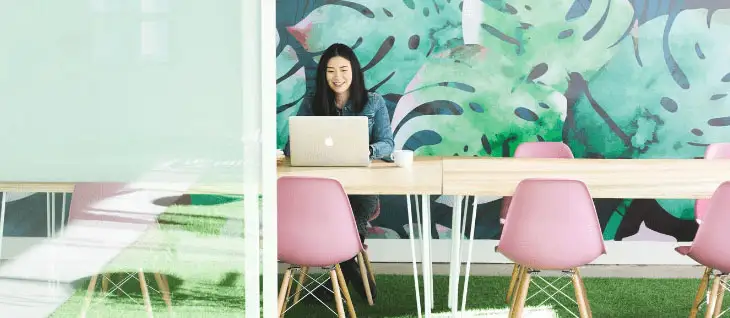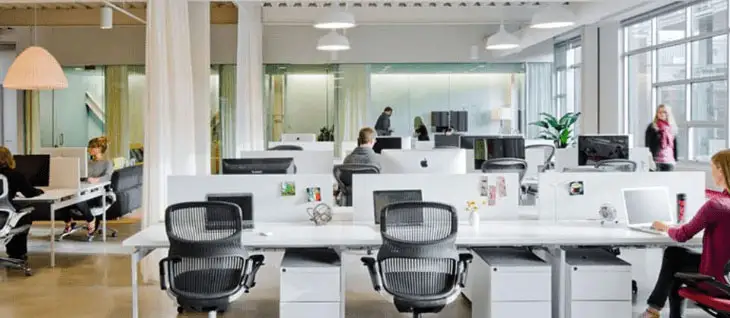An extraordinary 40-storey glass and timber tower packed with offices and green plants will soon soar over Sydney – and for the billionaire owners, it’s all about creating a standout place to work.
Scott Farquhar – who with Mike Cannon-Brookes owns Australia’s most successful software company, Atlassian – says the tower will be home to 4,000 workers.
“If you want to work in tech, this is the place you will want to be,” he told The Times.
“Buildings have to be a place where they attract your employees to come in and do their best work.”
Since coronavirus gave the world’s workers a taste of homeworking, getting people into the office has become a pretty tricky prospect…
Because people like being at home.
And many say they’re never, ever going back to the office fulltime again.
So how do you persuade your staff that the office is THE place to be?
Scott told Business Insider magazine that his new tower – the key building in a major regeneration of the area – will be purpose built to cater ‘for the future of work’.
And he points out that even a highly distributed workforce still needs a place to come together.
He’s right – and while not everyone can build a cool 40-storey HQ, I’m convinced every workplace can become more desirable…
So here are 5 ways to tempt people back to your workplace:
1. Help them feel safe
2. Make the space feel sociable
3. Mix up building use
4. Make the transition seamless
5. Help your space to be flexible
Helping your people feel safe
This is a biggie. A survey showed only 13% of UK working parents want to go back to the ‘old normal’, with fear of catching the virus a key reason.
So workplaces are trying hard to reassure employees with measures such as hand sanitiser easily available, socially distanced desks and extra cleaning.
Many are succeeding by using workplace technology in new ways, utilising people counting with occupancy sensors to enable proper social distancing of desks and in meetings.
The technology can also record details such as when a desk or room was last cleaned and who used it. This is pulled through to the app that workers use to book a safe space to work.
It all helps reassure workers who have been out of the office for months.
Making your space feel sociable
Before lockdown, many trendy workplaces had recognised that workers were spending an awful lot of time there.
They responded by adding in extra ‘fun’ – ping pong tables, for instance, and even in one case a slide from one floor to another. Some provided snooze pods for exhausted workers who needed to crash.
Today’s post-corona office will have to go beyond these gimmicks to become THE place to work – no-one’s going to be there long enough to need a nap.
There are ways to lure people away from the cosy pleasures of homeworking – and they all centre on being sociable
Human beings enjoy face-to-face interaction; it’s less strained than video or audio contact, and easily promotes friendship, teamworking and innovation.
That’s something that is hard to build and maintain by video. And so is the innovative value of chance encounters where colleagues spark ideas off each other – that’s a buzz everyone appreciates.
Workplaces will need to think hard about how their space can offer extended opportunities for being sociable (with social distancing incorporated, of course).

Mixing up building use
In future, it’s likely that homeworking will be more common than previously, and organizations will be rethinking their corporate real estate.
When this is added to the need to create a pleasant and enticing place to work, they’ll be taking a good look at how their office buildings can take a different shape.
Offices will be transformed into places to chat, to take part in an event; there’ll be shops to browse safely; even places to live – repurposing some no longer needed space as accommodation not only creates an income stream but also increases footfall.
Making the transition to the office seamless
Getting people into the office from home now needs to be as easy as possible, given the temptation to work from the kitchen v tackling a long commute.
Enabling staff to book a tailor-made desk or meeting space via an app, then check into it and out again using a QR code, removes an unpopular obstacle to getting on with the day’s work.
Helping your space to be flexible
Your available space is going to be even more flexible than before.
Flex space is office space that can be repurposed quickly and easily to match changing requirements – for meetings, for individual workstations, for brainstorming…
But unsupported flexibility can look a lot like chaos, and that’s never efficient.
Workspace technology combines safe and responsible control with maximum space utilisation – and creates reports that inform sensible and responsive planning decisions as requirements continue to evolve.
Conclusion – moving into post-pandemic operations
What will drive your post-pandemic operations?
Organizations around the world are thinking on their feet right now, making moves that balance operational necessity with putting worker wellbeing at the heart of their workspace plans.
New offices such as the Sydney tower will be built with these criteria in mind; existing workplaces are morphing and evolving as they strain to adapt.
It’s not easy, that’s for sure, and organizations worldwide will be keeping a keen eye on each other to see what works.
In the new work era, the golden prize will be giving staff the confidence to come in and enjoy the more positive – and irreplaceable – aspects of an office experience.
We may no longer be ‘at work’ long enough to need a sleep pod – but we’ll be enjoying the shorter time we spend there a whole lot more. And that’s got to be a good thing for everyone.
See your essential back-to-work-safely toolkit

